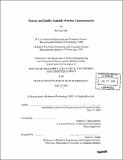Energy and quality scalable wireless communication
Author(s)
Min, Rex K. (Rex Kee), 1976-
DownloadFull printable version (23.54Mb)
Other Contributors
Massachusetts Institute of Technology. Dept. of Electrical Engineering and Computer Science.
Advisor
Anantha P. Chandrakasan.
Terms of use
Metadata
Show full item recordAbstract
Nodes for emerging, high-density wireless networks will face the dual challenges of continuous, multi-year operation under diverse and challenging operating conditions. The wireless communication subsystem, a substantial consumer of energy, must therefore be designed with unprecedented energy efficiency. To meet this challenge, inefficiencies once overlooked must be addressed, and the system must be designed for energy scalability, the use of graceful energy vs. quality trade-offs in response to continuous variations in operational conditions. Using a comprehensive model framework that unifies cross-disciplinary models for energy consumption and communication performance, this work explores multi-dimensional trade-offs of energy and quality for wireless communication at all levels of the system hierarchy. The circuit-level "knob" of dynamic voltage scaling is implemented on a commercial microprocessor and integrated into a power aware, prototype microsensor node. Power aware abstractions encourage collaboration between the hardware, which fundamentally dissipates the energy, and software, which controls how the hardware behaves. Accurate models of hardware energy consumption reveal inefficiencies of routing techniques such as multihop, and the models are fused with information-theoretic limits on code performance to bound the energy scalability of the hardware platform. An application-specific protocol for microsensor networks is evaluated with a new, interactive Java simulation tool created expressly for energy-conscious, high density wireless networks. Close collaboration between software and hardware layers, and across the research disciplines that compose wireless communication itself, are crucial enablers for energy-efficient wireless communication.
Description
Thesis (Ph. D.)--Massachusetts Institute of Technology, Dept. of Electrical Engineering and Computer Science, 2003. Includes bibliographical references (p. 165-171).
Date issued
2003Department
Massachusetts Institute of Technology. Department of Electrical Engineering and Computer SciencePublisher
Massachusetts Institute of Technology
Keywords
Electrical Engineering and Computer Science.